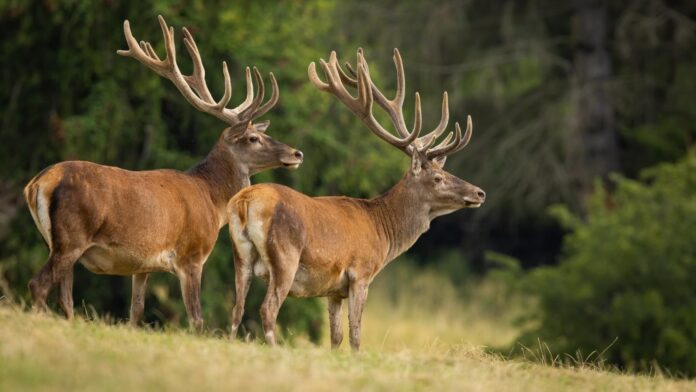A recent study published in the journal Current Biology reveals that reindeer use a unique multitasking approach to get enough sleep during the summer months, when food is abundant and reindeer feed almost 24/7 in preparation for the long and food-sparse arctic winter.
The researchers, led by neuroscientist Melanie Furrer of the University of Zurich, performed non-invasive electroencephalography (EEG) on adult female Eurasian tundra reindeer in Tromsø, Norway, during the autumn equinox, summer solstice, and winter solstice. The reindeer were part of a captive herd at UiT The Arctic University of Norway in Tromsø, and the experiments were conducted in indoor stables with controlled lighting, unlimited food, and constant temperature.
The study found that the more time the reindeer spend ruminating, the less time they spend in non-rapid eye movement (non-REM) sleep. EEG recordings revealed that reindeer’s brainwaves during rumination resemble the brain waves present during non-REM sleep, and these brainwave patterns suggest that the reindeer are more “rested” after ruminating.
“The more reindeer ruminate, the less additional non-REM sleep they need,” says Furrer. “We think it’s very important that they are able to save time and cover their sleep and digestive needs at the same time, especially during the summer months.”
The researchers speculate that this multitasking might help reindeer get enough sleep during the summer months, despite the lack of light-dark cycles in the Arctic during winter and summer. Unlike other species who change the amount they sleep in response to environmental conditions, reindeer slept approximately the same amount during winter, summer, and autumn, despite the fact that they were much more active during the summer.
One possible strategy is the opportunity for rest during rumination—the re-chewing of partially digested food, which is an important component of digestion for reindeer and other ruminants. The researchers found that the reindeer’s EEG readings during rumination resembled brainwave patterns that are indicative of non-REM sleep including increased slow-wave activity and sleep spindles.
The study also tested whether rumination could reduce the reindeer’s drive to sleep by depriving the reindeer of sleep for 2 hours and measuring their brain waves during sleep before and after this deprivation. Following sleep deprivation, the reindeer’s EEG readings showed increased slow-wave activity, suggesting that reindeer experience deeper sleep following sleep deprivation.
However, when the reindeer ruminated, this slow-wave activity was decreased during subsequent sleep, and the more they ruminated, the more the slow-wave activity decreased. “This suggests that rumination reduces sleep pressure, which could benefit the reindeer because it means they don’t have to compromise on sleep recovery when they spend more time ruminating,” says Furrer.
The research sheds light on the unique sleep patterns of Arctic-dwelling reindeer and their ability to multitask in order to get enough sleep and food during the summer months. Further studies are needed to compare the impact of rumination while sleeping with rumination while awake and to measure reindeer behavior and sleep in more natural outdoor conditions.
Journal Reference
- Melanie Furrer, Sara A. Meier, Maxime Jan, Paul Franken, Monica A. Sundset, Steven A. Brown, Gabriela C. Wagner, Reto Huber. Reindeer in the Arctic reduce sleep need during rumination. Current Biology. DOI: 10.1016/j.cub.2023.12.012
